| Chinese Films |
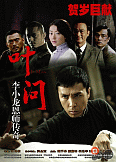
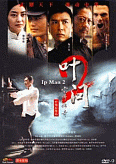

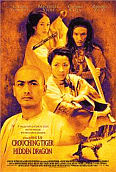
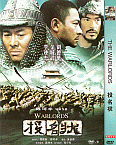
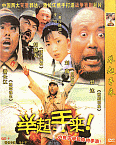
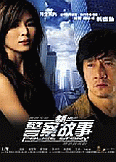
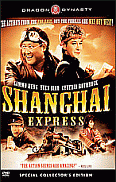




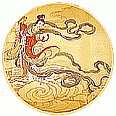
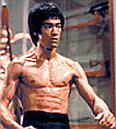
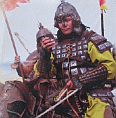
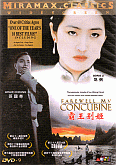
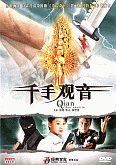
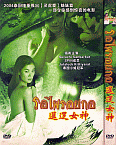
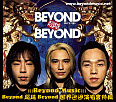


|
| Search Links |




|
| Chinese Opera |
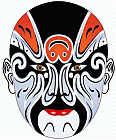
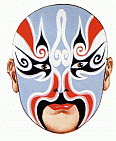
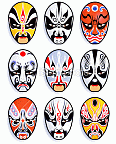
|
|
| Chinese
Opera |
Chinese Opera
in General |
|
|
Chinese Opera comes in many
forms and each is notable for its own unique style.
Whilst many foreigners sometimes joke that it sounds
like someone strangling a cat, this is most unfair as
it is a highly developed art form that many simply do
not understand. It is known as 'opera' to emphasise
this point.
This page will introduce the major styles and what is
special about each, with links to greater information
- of which Cultural China and Wikipedia are great sources.
The most noted forms are: Peking or Beijing Opera, Cantonese
or Yue Opera, Sichuan Opera, and Huang Mei Song. We
also briefly describe other important forms such as:
Ping, Henan, Qinqiang and Kunqu + mention the Shaw Brothers
studios in Hong Kong.
Introduction
Nearly all Chinese Opera are highly stylised stage performances
with performers wearing highly colourful and embellished
traditional Chinese dress. It can take half a day for
a top artiste to dress for performance, with several
hours alone being dedicated to the facial make-up, never
mind the hair! The productions are often set to grand
backdrops and echo the lives of the rich and influential.
Many tales are based in real history (Sometimes thousands
of years ago), or their performance keeps history alive
today.
To understand Chinese culture you will need to understand
the rudimentaries of Chinese Opera. The stories told
are often of deep significance to educated Chinese people
and signify a higher art form. Many such as the enduring
'Red Mansions' are equivalent of our western love for
Shakespeare and should be respected with equal reverence.
Chinese people may quote certain clauses in daily conversation,
much the same as we may do with extracts from The Bard.
Chinese Opera can trace its roots back to the third
century AD, and to Canjun opera of the Three Kingdoms
period, which was one of the first Chinese operatic
forms. Chinese opera in a more organized form began
in the Tang Dynasty with Emperor Xuanzong (712–755),
who founded the "Pear Garden" (梨园/梨園; líyuán),
the first known opera troupe in China. The troupe mostly
performed for the emperors' personal pleasure. To this
day operatic professionals are still referred to as
"Disciples of the Pear Garden" (梨园弟子/梨園弟子,
líyuán dìzi).
What is it All About?
With the exception of Huangmei Opera, most formal opera
tells just one story and is made up of many scenes that
comprise the whole. These are normally as the order
of events occurred, but occasionally 'reflections' are
used.
The art is judged by the singers voice control, which
whilst alien to many western ears, is extremely difficult
to master. There is great subtlety and pitch or warble
control used by the very best practitioners that would
defeat a top western concert singer. Nearly all singers
have a great range and often use extended voice, but
not falsetto. There are exceptions, as when males take
female roles, and vice versa.
This devotion to form of delivery is extended to presentation,
where one short clause such as 'I love You' could take
many minutes to be sung. Each equivalent of our western
syllables is often exaggerated and extended whilst the
performer conveys additional substance to the work by
gestures and pose.
Beijing Opera, known also as Peking Opera
京剧 (Jing Ju)
This is regarded as the standard opera of China, and
its highest evolution by many. It is always performed
in Mandarin and may be thought of as a state institution.
There are University campus devoted solely to Beijing
Opera, whose young talent often goes on to careers on
stage, or in film and television. You may note that
when surfing Chinese TV there will be a couple of channels
only showing Beijing Opera.
Beijing Opera is noted for its colourful faces with
hugely artful and diversified facial makeup, which can
be used for four purposes:
1. indicate personalities.
2. introduce characteristics.
3. tell good and evil.
4. distinguish beauty and ugliness.
Cantonese Opera, know as Yue Ju 粵劇
'Yue' is what Cantonese people call themselves and 'ju'
means opera or show. Yue Opera is performed in Cantonese
and covers the Cantonese speaking world, roughly: Guangdong,
Guangxi, Northern Vietnam, Hong Kong, Macao, Singapore
and Malaysia. In many ways it is quite similar to Beijing
Opera, but differs in that greater use is made of facial
make-up of some quite bizarre forms to accentuate the
characters or deliver hidden messages. Like other mainstream
form of Chinese opera, Yue Ju contains: music, singing,
martial arts, acrobatics and acting, which all featuring
prominently. Most of the plots are based on Chinese
history and famous Chinese classics and myths. The culture
and philosophies of the Chinese people can be seen in
the plays. Virtues like loyalty, moral, love, patriotism
and faithfulness are often reflected by the operas.
Cantonese opera is less concerned to a degree with formalised
styling, although it has produced some of the artistes
regarded as national treasures. Most of the cast are
usually female and in turn this opera style has little
acrobatics and fighting (in the form of 'action' sequences).
However the melodies are exceptional and one such gave
rise to the famous film and story 'The Butterfly Lovers'.
I watched a complete show one evening when I was living
on the island, and whilst half of it passed me by,
the rest was fast and entertaining. I remember laughing
at one comedy scene, even though my grasp of Cantonese
remains limited. Given that I was living on an island
with a population of a few hundred people 4, 000 turned
up every evening for three days to watch this travelling
troupe. I was there on the last night and in company
with the island administrator. After the show the director
and stars joined us at the village shop for a beer and
chat. I think they were just as surprised to find me
there as I was them. Remarkable!
Sichuan Opera
This form of opera is widely known all over China and
sometimes incorporated into shows for the opera fan.
It is delivered in Mandarin and takes face painting
to an extreme that is highly colourful and entertaining.
Today's Sichuan opera is a relatively recent synthesis
of 5 historic melodic styles. Regionally Chengdu remains
to be the main home of Sichuan opera, while other influential
locales include Chongqing, Guizhou, Yunnan, Hubei and
Taiwan
One of the greatest arts is what is known as 'Changing
Faces', where the actor by some hidden means instantly
changes his current face mask for something completely
different. This is a top secret skill that very few
people know. Having watched this several times I can
tell you this is excellent theatre. The masks appear
to change with a flick of the head, no other means being
viable. A top artiste may change the face 20 times over
the course of a performance, and even within the space
of a minute!
Overall the art form is well known for its singing,
which is less constrained than that of the more popular
Beijing opera form. Sichuan opera is more like a play
than other forms of Chinese opera, and the acting is
highly polished.The music accompanying Sichuan opera
utilizes a small gong and an instrument called a Muqin,
which is similar to the Erhu.
The traditional formula is quite systematic with a combination
of stunts like face-changing, tihuiyan, sword-hiding,
fire-spitting and beard-changing with the plot and different
characters
Ping Opera 评剧 (Ping Ju)
Ping opera originated in Tangshan region, east of Beijing
and is renown for its plain scripts, which are very
easy for the audience to understand. This makes it popular
with rural communities and especially where people are
not well educated. Since the beginning of last century,
unlike the other operas that are focused on historical
theme topics, Ping opera focuses mostly on modern topics,
which is very unique in contemporary Chinese opera.
Henan Opera 豫剧 (Yu Ju)
This form of opera is mainly known in the central regions
of China, being watched from Tibet through to the northern
border. It has attained great following and is the only
form of opera to not require funding by the state. It
is also only the second form of opera after Beijing
opera to have travelled on tour to Europe.
Qinqiang Opera
This opera form originates from Shaanxi province. It
is often considered to be the sixth most popular Chinese
opera. It also has the oldest and richest characteristic
melody system in Chinese opera. Some people even credit
as the “Oldest Chinese opera”.
Kunqu Opera
Kunqu opera has been known for over 600 years of continuous
history and is known as the “teacher” or “mother” of
a hundred operas. This is because of its influence on
other Chinese theatre forms, including Peking Opera.
|
|
Huangmei Song 黄梅戏
originally "Caicha Opera"
This form of opera is very different from the others
above and is based upon the lives of rural peasants
and from the songs and lives of tea pickers. It originated
in Cai Cha region of Huangmei County in Hubei Province.
Following devastating floods the population migrated
to Anqing region of Anhui Province. Performances often
depict individual items, such as the rendition of a
favourite song or story, which makes many shows far
more varied and interesting.
However, Huangmei opera has also grown and developed
with age and now boasts full performances dedicated
to only one subject. One of the most enduring mini-opera's
is entitled 'Lament of a Child Bride' (Correctly: 'Lament
of a Miserable Child Bride'). It tells the story of
a young girl (12 years old I think) who was sold as
a child bride by her parents. It details her sad life
until the time of her escape - something rare, common,
or often ending in young suicide. This became mainstream
with the arrival of Mei Lang Fong, who was herself a
child bride and escaped with nothing but her life and
a burning desire to live. She was adopted by a travelling
theatre troupe and later became a star known all over
China as their most famous opera singer. When she sang
this tale it was a direct recount of her early life,
and warmed the hearts of many.
Another classic tale is called 'Flood Refuge' made famous
by Hu Paya in 1884. Notable others include the performers:
Wu Pu Yang and Shi Pai.
Other famous works:
Emperor's Female Son-in-law (Nu Fuma):
Feng Suzhen is engaged to Li Zhaoting. But misfortune
befalls Li's family: Feng's father doesn't want his
daughter to marry Li and puts him into prison. The father
wants to marry Feng off to a rich and powerful family,
but Feng doesn't agree. Feng disguises herself as a
man and goes to the capital to take the imperial examinations.
She wins the title of "Number One Scholar"
and is made the emperor's son-in-law. In the bridal
chamber, Feng tells the truth to the princess, who shows
deep sympathy for her. The "couple" go to
see the emperor and the emperor absolves Feng from guilt.
Later, Feng marries Li and the princess marries Feng's
brother, a former "Number One Scholar."
Employer Deceived (Mulaohu Shang Jiao):
Qian Fu, a waiter with the Shilixiang Wine Shop,
flatters his boss, a shrew, in order to marry her
daughter. He then persuades her to fire Sun Chengpu,
an honest waiter. The boss is deceived by Qian's flattery
until she is forced to pay his debts. At last, she
sees his dishonesty and marries her daughter instead
to Sun Chengpu.
Fallen Stars (Niulang Zhinu):
Niulang and Zhinu are stars in the heavens who come
to earth and become a couple. Zhinu gives birth to a
son and a daughter. But when the Heavenly Queen hears
the news, she sends generals to bring Zhinu back and
separates the couple with a heavenly river. From then
on, the couple can meet only once a year on the seventh
day of the seventh month. This is known as Double Seven
Festival and is Chinese Valentine's Day
Goddess' Marriage (Tianxian Pei):
Dong Yong's father dies. In order to raise money to
bury his father, he has to serve as a slave for three
months in Landlord Fu's family. The Jade Emperor's seventh
daughter, who sympathizes with Dong, descends to the
world and marries him. However, when the two leave Fu's
family for home, the Jade Emperor orders the goddess
to return to the Heavenly Palace. The husband and wife
part reluctantly.
You can find good resources on the following websites:
China
Vista Interesting introduction and worth reading.
China
Corner Another good website containing a little
more information
Wikipedia
Shaw Brothers
No description of Huangmei Opera would be complete without
mention of the famous Shaw Brothers studios in Hong
Kong. For several most of the last century (1920 - 1990)
they produced a significant amount of films which are
still popular today on Chinese Television, and pioneered
a genre. They would normally be made in Cantonese, but
often dubbed or re-shot in Mandarin.
To their great credit, Shaw Brothers did much to promote
Chinese culture to the masses, and also brought through
many students to fame and stardom. One of their most
enduring hits (Still popular today) was entitled 'The
Love Eterne' (traditional Chinese: 梁山伯與祝英台; pinyin:
Liang Shan Bo yu Zhu Ying) and this is regarded as a
modern day classic and esteemed as a Chinese 'Romeo
and Juliet'.
Wikipedia
- The Love Eterne
We will leave this here, but please see our links below
for a lot more information:
Jump-Cut
Great website with a lot of information
Wikipedia
De facto take on The Shaw Brothers
Farewell My Concubine 霸王别姬
This recent film has won international honours and is
available in English. It charts the life of a top Opera
star from his early childhood of lowly birth and harsh
circumstances, through the rigours of his early life,
to his rise as China's premier opera star. It is notable
that he plays the female lead, whilst his equally disadvantaged
friend plays the male lead.
This story is absorbing within itself, and flows well
from childhood, through adolescence, to stardom. What
is of great intrigue is the main sub-plot, which focus'
on his sexuality. It is this theme that pushes the boundaries
in China, a country where homosexuality is thought of
as being impossible. However, we are left to ponder
whether the main protagonists are 'gay' because of their
personal sexual orientation, or because of extenuating
circumstances forced upon them in childhood? Worthy
of Mainstream world cinema and most thoroughly engaging.
Farewell
My Concubine Free download from Youku in Mandarin
More information:
Wikipedia have an excellent and in depth section devoted
to all the different styles of Chinese Opera - there
are perhaps 100 of them! Their introductory page is
here below:
http://en.wikipedia.org/wiki/Chinese_opera
Cultural China is a fantastic website for those wishing
to learn more about all forms of Chinese opera. Their
in depth descriptions are supported by excellent photographs
and some videos.
http://arts.cultural-china.com/27two.html
|
|
|
This information is as supplied by ourselves, and ably
supported by our friends and various internet portals: |
| |
|
| Search
this Website |
|
|
| Chinese Opera |
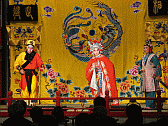
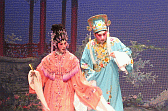
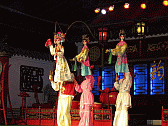
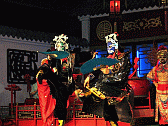
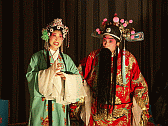
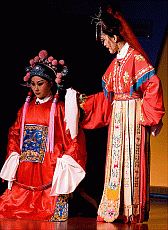
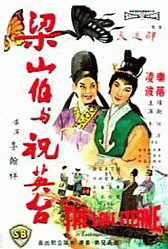
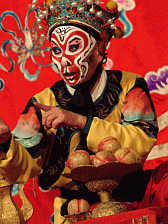
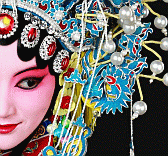
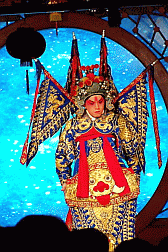
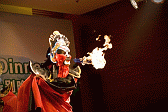

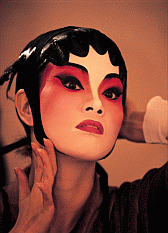
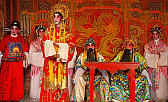
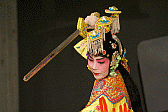
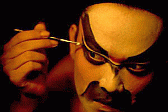
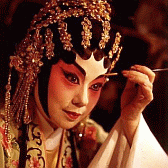
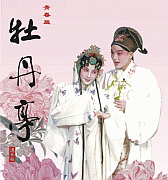
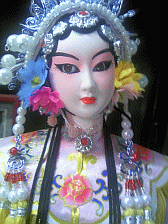
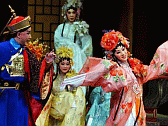
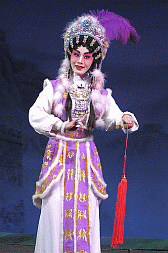
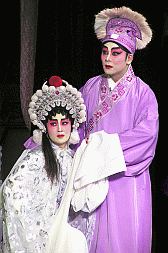
|
|